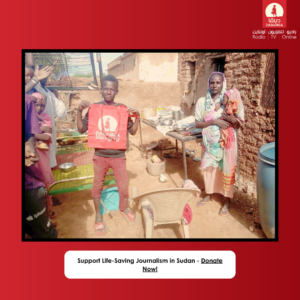Journalists allowed to travel into Darfur after criticism
The Sudanese Ministry of Culture and Information announced on Tuesday that foreign journalists will be allowed to travel to all regions in the western parts of Sudan, including the West Darfur capital El Geneina where the security situation is still volatile, after widespread criticism.
 Minister of Culture and Information Feisal Mohamed Saleh in 2020 (SUNA)
Minister of Culture and Information Feisal Mohamed Saleh in 2020 (SUNA)
The Sudanese Ministry of Culture and Information announced on Tuesday that foreign journalists will be allowed to travel to all regions in the western parts of Sudan, including the West Darfur capital El Geneina where the security situation is still volatile, after widespread criticism.
The ministry explained in a press statement that the travel ban issued earlier this week was solely in place for El Geneina and concerned only foreign journalists and correspondents of foreign media organisations who applied for permission to visit.
The ban on journalists, announced by the West Darfur authorities, triggered widespread criticism.
However, the ministry explained that the External Media Department is the authority responsible for issuing travel permits, not the West Darfur authorities.
The Information Ministry has agreed to facilitate the movement of journalists in the region with the Military Intelligence in Darfur, after some journalists faced difficulties moving around.
The spokesperson for the Sudan Armed Forces (SAF) denied restricting or preventing journalists and correspondents from reaching Darfur and confirmed that the Military Intelligence did not prevent travel anywhere within Sudan, nor did it receive any complaints.
The SAF and Military Intelligence affirmed their commitment to facilitate the arrival and travel of journalists to areas with high insecurity and even accompany them, if the security situation requires it, to provide the necessary protection and ensure the unconditional freedom of movement.
Nearly two weeks ago, the West Darfur capital El Geneina and the two Kerending camps for the displaced were attacked by large groups of Arab gunmen. At least 163 people died and about 100,000 people fled their homes.
The excessive violence was triggered by the killing of an Arab herdsman by a member of the Masalit tribe. Though the perpetrator was arrested, the relatives of the victim sought revenge by themselves and attacked El Geneina and the two camps “from all directions”. The violence continued for multiple days.
Criticism
In a statement on Tuesday, the Sudanese Journalists Network (SJN) denounced the ban, which it described as “the blatant interference of the military in with the media, and the limitation and restriction of the movement of journalists and reporters”.
According to the SJN, officers of the Military Intelligence refused to issue a travel permit to foreign correspondents who wanted to visit Darfur.
The Sudan Liberation Movement under the leadership of Abdelwahid El Nur (SLM-AW) also fiercely criticised the decision to prevent journalists from going to Darfur.
“We read with great concern about the decision issued by the so-called Military Intelligence Department, which banned the travel of Sudanese and foreign journalists to the afflicted Darfur region,” Mohamed El Nayer, spokesperson for the SLM-AW, said in a statement on Tuesday.
“This unjust decision is an explicit infringement of the goals and slogans of the glorious December revolution and a flagrant violation of the freedom of the media to access information and publish on the daily atrocities that are taking place.”
“The widespread crimes and violence that are taking place and the looming heralds of a new genocide against defenceless civilians in the Darfur region are not hidden from the world and cannot be hidden from the eyes of the international media, no matter what the new dictators do,” the statement reads.
The SLM-AW one of the hold-out rebel movements. It is not a signatory of the Juba Peace Agreement, signed on October 3 last year, and still has a number of bases in Jebel Marra.
So far, El Nur has stuck to his position that he will only join negotiations after security and stability have been realised in Sudan’s conflict-torn western region.
Reports of insecurity and attacks on civilians, especially displaced persons, continue to proliferate in Darfur.
Yesterday, Radio Dabanga reported that at least 3,000 people fled their homes in East Jebel Marra, South Darfur, after groups of gunmen attacked villages in the area on Sunday. At least six were killed and the attackers are still roaming the area.
Last weekend, the SLM-AW was also attacked in East Jebel Marra.
Radio Dabanga’s editorial independence means that we can continue to provide factual updates about political developments to Sudanese and international actors, educate people about how to avoid outbreaks of infectious diseases, and provide a window to the world for those in all corners of Sudan. Support Radio Dabanga for as little as €2.50, the equivalent of a cup of coffee.












 and then
and then